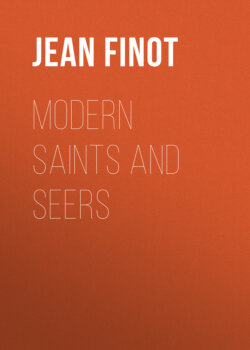Читать книгу Modern Saints and Seers - Jean Finot - Страница 24
На сайте Литреса книга снята с продажи.
THE SPIRITUAL CHRISTIANS
ОглавлениеThe Slavonic atmosphere exhales an intense longing for the ideal and for heaven. Often a kind of religious ecstasy seems to sweep over the whole length and breadth of the Russian territories, and Tolstoi's celebrated doctrines reflected the dreamy soul of the moujik and the teachings of many Russian martyrs. It would, however, be a mistake to suppose that it is only the peasants buried in the depths of the country who provide favourable soil for the culture of the religious bacillus. It is the same with all classes—merchants, peasants, labourers and aristocrats.
The working-classes, especially those of the large towns, usually offer more resistance to the influence of religious fanatics, but in Petrograd and Moscow they are apt to follow the general current. Lack of space forbids us to study in all their picturesque details the birth and growth of religious sects in these surroundings. We must confine ourselves to one of the more recent manifestations—that of the mysterious "spiritual Christians."
In 1893, a man named Michael Raboff arrived in St. Petersburg. Peasant by birth, carpenter by trade, he immediately began to preach the tenets of his "spiritual Christianity." He became suspect, and with his friend Nicholas Komiakoff was deported to a far-distant neighbourhood; but in spite of this his seed began to bear fruit, for the entire district where he and Komiakoff were sent to work was soon won over to the new religion. The director himself, his wife, and all his workmen embraced it, and though the workshops were closed by the police, the various members distributed themselves throughout the town and continued to spread Raboff's "message." Borykin, the master-carpenter, took employment under a certain Grigorieff, and succeeded in converting all his fellow-workers. Finally Grigorieff's house was turned into a church for the new sect, and an illiterate woman named Vassilisa became their prophetess. Under the influence of the general excitement, she would fall into trances and give extravagant and incomprehensible discourses, while her listeners laughed, danced and wept ecstatically. By degrees the ceremonial grew more complex, and took forms worthy of a cult of unbalanced minds.
At the time when the police tried to disperse the sect it possessed a quite considerable number of adherents; but it died out in May, 1895, scarcely two years after its commencement.
The "spiritual Christians" called themselves brothers and sisters, and gave to Raboff the name of grandfather, and to the woman Vassilisa that of mother. They considered themselves "spiritual Christians" because they lived according to the spirit of Christianity. For the rest, their doctrine was innocent enough, and, but for certain extravagances and some dangerous dogmas borrowed from other sects, their diffusion among the working-classes of the towns might even have been desirable. Sexual chastity was one of their main postulates, and they also recommended absolute abstention from meat, spirits, and tobacco. But at the same time they desired to abolish marriage.
When the police raided Grigorieff's workshops, they found there about fifty people stretched on the ground, spent and exhausted as a result of the excessive efforts which Raboff's cult demanded of them. At their meetings a man or woman would first read aloud a chapter from Holy Scripture. The listeners would make comments, and one of the more intelligent would expound the selected passage. Growing more and more animated, he would finally reach a state of ecstasy which communicated itself to all present. The whole assembly would cry aloud, groan, gesticulate and tear their hair. Some would fall to the ground, while others foamed at the mouth, or rent their garments. Suddenly one of the most uplifted would intone a psalm or hymn which, beginning with familiar words, would end in incoherency, the whole company singing aloud together, and covering the feet of their "spiritual mother" with kisses.
